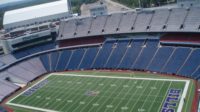From 2018 until March, California private equity billionaire Ronald Burkle and his company worked closely with a top stadium designer, HNTB, and a leading stadium construction manager, M.A. Mortenson Co., on a plan for a new Sacramento facility to host a franchise Burkle planned to purchase.
It was to be one of the key components of the city's decades-long Railyards redevelopment project.
Then in March, Burkle's company called off the team acquisition and stadium plan, citing the pandemic, leading to Minneapolis-based Mortenson's Aug. 12 filing of a lawsuit in federal court in Sacramento that seeks $1.3 million for its pre-construction services.
Mortenson's lawsuit claims Yucaipa Cos. repeatedly brushed off the construction manager's requests to execute a contract as “mere formalities.”
The only problem is that there was no signed contract between the parties.
Mortenson claims it never intended its services to be speculative. Its lawsuit states that leaders of Burkle's firm, Yucaipa Cos., repeatedly brushed off the construction manager's requests to execute a contract as "mere formalities," and failed to pay submitted invoices while assuring the firm that the project would go forward.
Neither Burkle nor Yucaipa responded to ENR's requests for comment.
Commercial developers in the past have run up big tabs with designers in hopes those projects will come to fruition. But most construction management contracts spell out the terms for pre-construction consulting. How often construction managers find themselves going unpaid for extensive work before ground is broken, or how many just eat the costs and walk away, is unknown.
But attorneys in the past have stressed that while verbal agreements are legally binding, enforcing them is tricky.
"Naturally, they bring with them a host of challenges," notes Craig Wallace, a member of the law practice Smith, Currie & Hancock.
"A jury will be required to figure out many of the fact issues related to an alleged oral contract," he says. "While fully executed oral agreements are enforceable, a partially performed contract might be more difficult to prove. Establishing the oral agreement requires identifying the offer and acceptance, along with consideration.
In addition, California recognizes a number of similar theories in the absence of a written agreement, says Wallace. "For example, there is an implied contract which arises out of the parties’ conduct. The right to restitution or quasi-contractual recovery is based upon unjust enrichment. And that provides a recovery to one who provides services at the request of another if that latter party obtains a benefit."
In contrast, he adds, "an agreement to agree is typically not enforceable."
Attorneys have said that to enforce verbal agreements in court, the agreement should involve an offer, its acceptance and the exchange of some consideration. But often the evidence involves a difficult "he said, she said" set of competing testimony, notes the Katz Law Group, based in Westborough, Mass.
Wallace says that even if an oral contract exists, establishing the damages can prove challenging. "One needs to establish what was promised or requested, how one performed or did not perform, and what was the promised value," he says.
Donald Oder, a San Diego-based attorney who practices in California, has written that a verbal agreement can't be enforced in his state if it is vague, the terms are misunderstood by one party or the other, or provisions are not to be performed for a year after agreement has been made.
Because of the problems of enforcement, wrote Oder, "the most effective method of proving an oral contract is via the presentation of a neutral witness to the agreement who can attest to its existence and confirm its details."
According to the lawsuit, there were other parties at many of the meetings conducted to plan the stadium design and construction, including ICON Venue Group, the developer's representative, and HNTB, the architect of record.
Weekly Progress Meetings
After being formally designated as construction manager in late 2019 and beginning in 2020, according to Mortenson, company staff met with ICON, HNTB and other stakeholders in weekly progress meetings. Monthly meetings for project principals also took place. And Mortenson began submitting invoices for pay applications for its work in June. The first, submitted in June for $601,000, covered Mortenson's work on the project going back to January 2020.
It isn't clear if other consultants to the project had been paid for services. HNTB could not immediately be reached for comment.
According to Mortenson, its staff "would ask when the Construction Agreement was going to be finalized, and Yucaipa, or ICON on behalf of Yucaipa, stated repeatedly that the agreements were "mere formalities and that the Project was moving forward."
The only thing holding it up was Yucaipa's negotiation with Major League Soccer over the franchise fee, Mortenson claims it was told. The firm adds that at no time did Yucaipa tell Mortenson that it might not be compensated.






Post a comment to this article
Report Abusive Comment